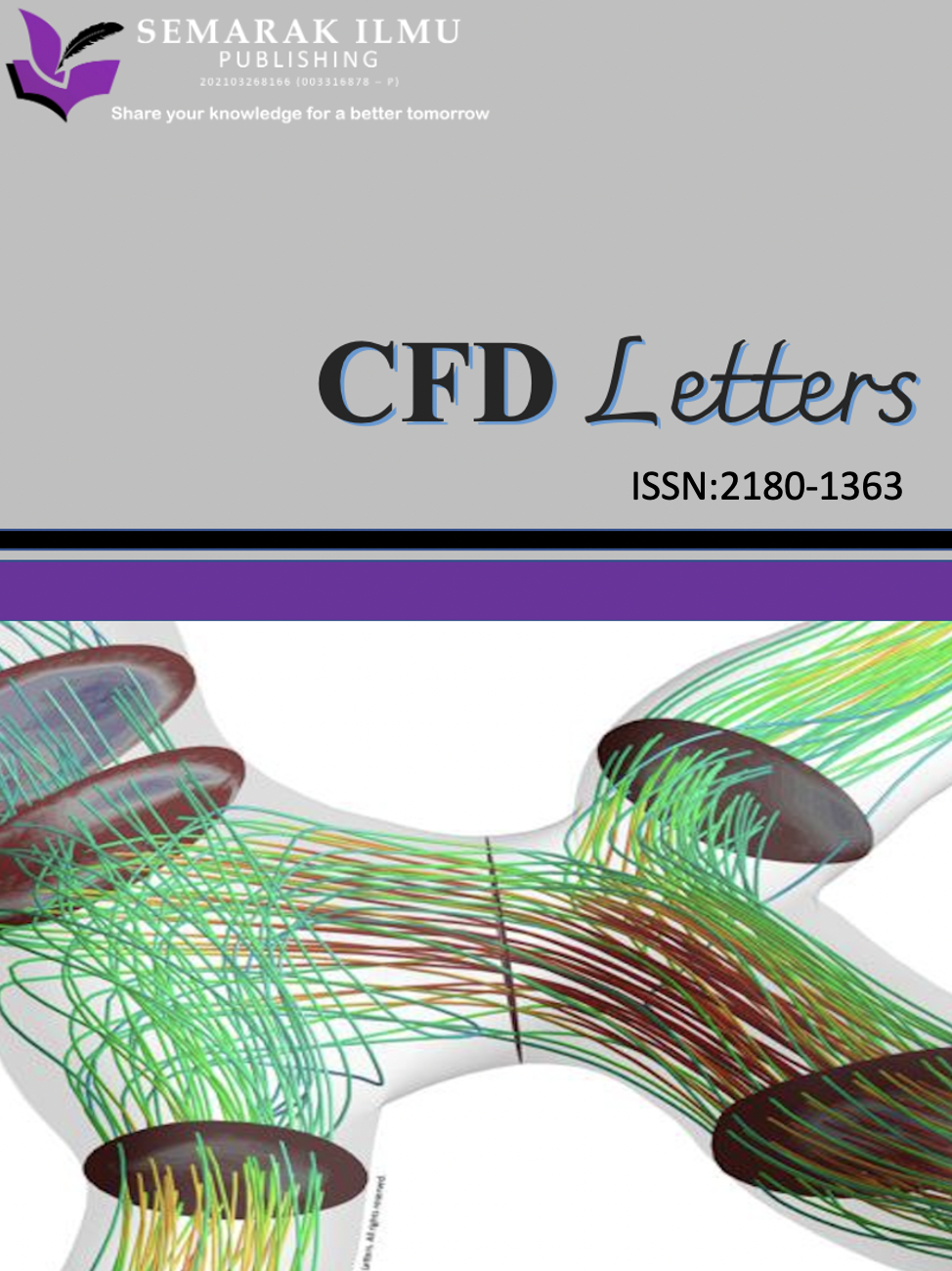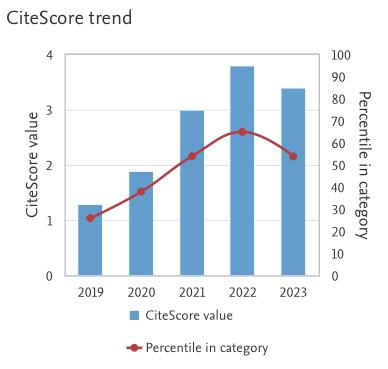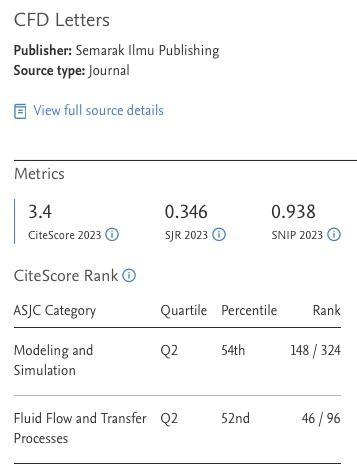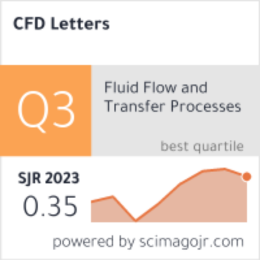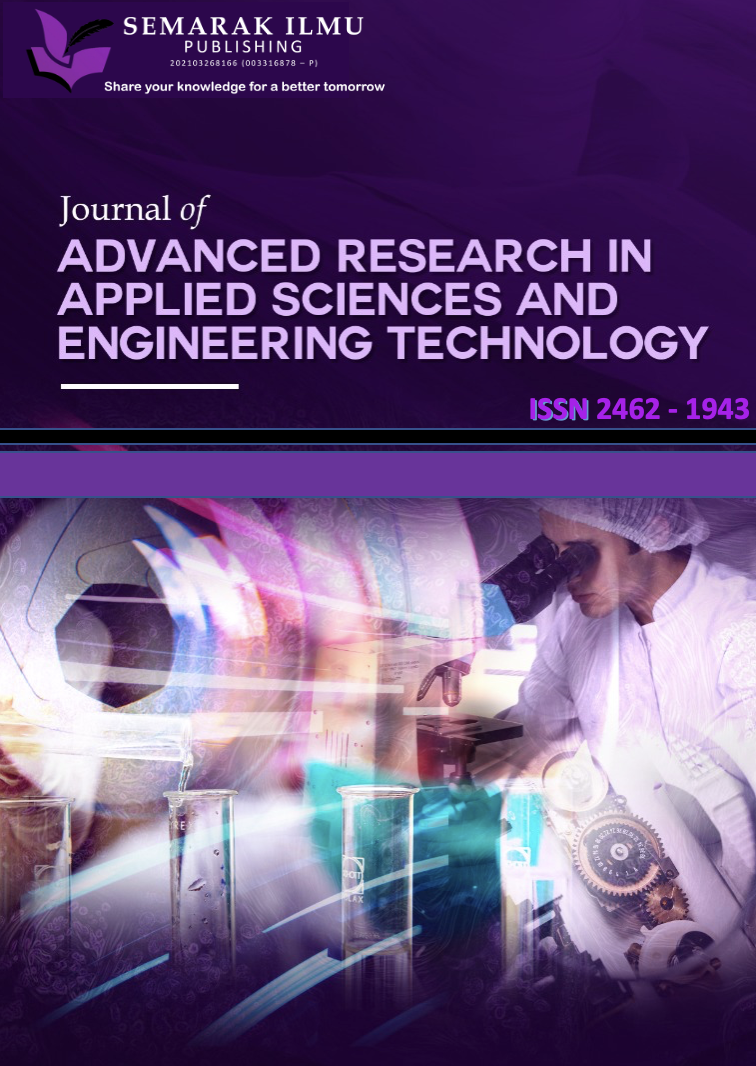Impact of Ambient Temperature and Humidity on the Performance of Vapour Compression Air Conditioning System - Experimental and Numerical Investigation
DOI:
https://doi.org/10.37934/cfdl.16.7.121Keywords:
Modelling, simulation, COMSOL, Vapour Compression, Air Conditioning SystemAbstract
Due to global warming, population growth, and urbanisation, demands for space cooling in buildings have significantly increased. Mechanical vapour compression cooling technology is relatively mature, well-understood and most commonly used globally. However, they suffer from high energy consumption and adverse environmental impact due to the refrigerants used. As ambient temperature and humidity have significant effects on the performance of vapour compression systems, this paper experimentally and numerically investigates their impact on the performance of vapour compression air conditioning system in terms of power consumption and cooling capacity. It was concluded that at ambient humidity of 55%, as the ambient temperature increases from 22 °C to 40 °C, the compressor temperature has increased from 46 °C to 59 °C which increased its power consumption from 751.2 to 935.52 Watts, giving an increase of 10.24 Watts for every one degree of ambient temperature increase. Also, as ambient humidity in-creased from 32% to 88%, the power consumption increased from 739.2 Watts to 853.2 Watts, an increase of 114 Watts. A validated CFD (Computational Fluid Dynamics) model was developed and predicted a loss in the enthalpy change from 11.7kJ/kg.d.a to 3.6kJ/kg.d.a. due to ambient temperature increasing from 22 °C to 40 °C and a loss of enthalpy change from 12.857kJ/kg.d.a to 5.524kJ/kg.d.a. due to increasing the ambient air humidity from 32% to 88%. This work high-lighted the impacts of ambient conditions on the performance of vapour compression cooling system in terms of increased power consumption and loss of cooling capacity.
Downloads
References
“International Energy Agency (IEA), Perspectives for the clean energy transition,” Sustainable Energy Technologies and Assessments. 2021.
T. Uk, “Sustainable cooling,” no. 642, pp. 1–8, 2021, [Online].
Sajjad, Uzair, Naseem Abbas, Khalid Hamid, Saleem Abbas, Imtiyaz Hussain, Syed Muhammad Ammar, Muhammad Sultan, Hafiz Muhammad Ali, Muzamil Hussain, and Chi Chuan Wang. "A review of recent advances in indirect evaporative cooling technology." International Communications in Heat and Mass Transfer 122 (2021): 105140. https://doi.org/10.1016/j.icheatmasstransfer.2021.105140
Jacob, Tabeel A., Nihar Shah, and Won Young Park. "Evaluation of hybrid evaporative-vapor compression air conditioners for different global climates." Energy Conversion and Management 249 (2021): 114841. https://doi.org/10.1016/j.enconman.2021.114841
Shah, Surendra H., Kalash R. Pai, Sachin R. Shinde, and Bhaskar N. Thorat. "Analysis of a vapor compression refrigeration system using a fog-cooled condenser." Applied Thermal Engineering 196 (2021): 117299. https://doi.org/10.1016/j.applthermaleng.2021.117299
Kulkarni, Sourabh, Shriramshastri Chavali, and Shruti Dikshit. "A review on analysis of Vapour Compression Refrigeration System (VCRS) for its performance using different ecofriendly refrigerants and nanofluids." Materials Today: Proceedings 72 (2023): 878-883. https://doi.org/10.1016/j.matpr.2022.09.085
Mahmood, R. A., O. M. Ali, A. Al-Janabi, G. Al-Doori, and M. M. Noor. "Review of mechanical vapour compression refrigeration system part 2: performance challenge." International Journal of Applied Mechanics and Engineering 26, no. 3 (2021): 119-130. https://doi.org/10.2478/ijame-2021-0039
Franco, S. S., J. R. Henríquez, A. A. V. Ochoa, J. A. P. Da Costa, and K. A. Ferraz. "Thermal analysis and development of PID control for electronic expansion device of vapor compression refrigeration systems." Applied Thermal Engineering 206 (2022): 118130. https://doi.org/10.1016/j.applthermaleng.2022.118130
Shah, Nihar, Max Wei, Virginie Letschert, and Amol Phadke. Benefits of energy efficient and low-global warming potential refrigerant cooling equipment. No. LBNL-2001229. Lawrence Berkeley National Lab.(LBNL), Berkeley, CA (United States), 2019. https://doi.org/10.2172/1559243
Cengel, Yunus A., Michael A. Boles, and Mehmet Kanoğlu. Thermodynamics: an engineering approach. Vol. 5. New York: McGraw-hill, 2011.
Alawadhi, Mubarak, and Patrick E. Phelan. "Review of Residential Air Conditioning Systems Operating under High Ambient Temperatures." Energies 15, no. 8 (2022): 2880. https://doi.org/10.3390/en15082880
Bezerra, Paula, Fabio da Silva, Talita Cruz, Malcolm Mistry, Eveline Vasquez-Arroyo, Leticia Magalar, Enrica De Cian, André FP Lucena, and Roberto Schaeffer. "Impacts of a warmer world on space cooling demand in Brazilian households." Energy and Buildings 234 (2021): 110696. https://doi.org/10.1016/j.enbuild.2020.110696
Cao, Jingfu, Mingcai Li, Min Wang, and Bojia Li. "Impacts of temperature and humidity changes on air‐conditioning design load under the climate change conditions in different climate zones of China." Meteorological Applications 28, no. 5 (2021): e2026. https://doi.org/10.1002/met.2026
Ambarita, H., A. Halim Nasution, S. Ginting, and H. V. Sihombing. "The optimum temperature of single-stages vapor compression refrigeration cycle for Air-Conditioning unit." In IOP Conference Series: Materials Science and Engineering, vol. 420, no. 1, p. 012038. IOP Publishing, 2018. https://doi.org/10.1088/1757-899X/420/1/012038
Zaidan, Maki H., Thamir K. Ibrahim, and Aadel AR Alkumait. "Performance enhancement by using wet pad in vapor compression cooling system." Journal of Engineering and Technological Sciences 51, no. 1 (2019): 48-63. https://doi.org/10.5614/j.eng.technol.sci.2019.51.1.4
Mitrakusuma, Windy H., Apip Badarudin, Hafidz Najmudin, and Andriyanto Setyawan. "Performance of split-type air conditioner under varied outdoor air temperature at constant relative humidity." Journal of Advanced Research in Fluid Mechanics and Thermal Sciences 90, no. 2 (2021): 42-54. https://doi.org/10.37934/arfmts.90.2.4254
Yusof, Mohd Hazwan, Sulaiman Mohd Muslim, Muhammad Fadhli Suhaimi, and Mohamad Firdaus Basrawi. "The effect of refrigerant charge and outdoor temperature on the condenser and evaporator of a split-unit type air conditioner using R22 refrigerant." In MATEC Web of Conferences, vol. 225, p. 02013. EDP Sciences, 2018. https://doi.org/10.1051/matecconf/201822502013
Setyawan, Andriyanto, Hafid Najmudin, Apip Badarudin, and Cecep Sunardi. "Evaluation of Split-Type Air Conditioner Performance under Constant Outdoor Moisture Content and Varied Dry-Bulb Temperature." International Journal of Heat & Technology 40, no. 5 (2022). https://doi.org/10.18280/ijht.400521
Yau, Y. H., and H. L. Pean. "The performance study of a split type air conditioning system in the tropics, as affected by weather." Energy and buildings 72 (2014): 1-7. https://doi.org/10.1016/j.enbuild.2013.12.010
Yau, Y. H., and H. L. Pean. "The performance study of a split type air conditioning system in the tropics, as affected by weather." Energy and buildings 72 (2014): 1-7. https://doi.org/10.1016/j.enbuild.2013.12.010
Khalifa, Abdul Hadi N., Johain J. Fataj, and Ali K. Shaker. "Performance study on a window type air conditioner condenser using alternative refrigerant R407C." Engineering Journal 21, no. 1 (2017): 235-243. https://doi.org/10.4186/ej.2017.21.1.235
Setyawan, Andriyanto, Susilawati Susilawati, Tandi Sutandi, and Hafid Najmudin. "Performance of Air Conditioning Unit under Constant Outdoor Wet-Bulb Temperature and Varied Dry-Bulb Temperature." International Journal of Heat & Technology 39, no. 5 (2021). https://doi.org/10.18280/ijht.390510
Bilgili, M. E. H. M. E. T., A. Ozbek, A. Yasar, E. Simsek, and B. Sahin. "Effect of atmospheric temperature on exergy efficiency and destruction of a typical residential split air conditioning system." International Journal of Exergy 20, no. 1 (2016): 66-84. https://doi.org/10.1504/IJEX.2016.076679
Ding, Yanjun, Qinhu Chai, Guoyuan Ma, and Yi Jiang. "Experimental study of an improved air source heat pump." Energy Conversion and Management 45, no. 15-16 (2004): 2393-2403. https://doi.org/10.1016/j.enconman.2003.11.021
Wang, Xudong, Yunho Hwang, and Reinhard Radermacher. "Two-stage heat pump system with vapor-injected scroll compressor using R410A as a refrigerant." International Journal of Refrigeration 32, no. 6 (2009): 1442-1451. https://doi.org/10.1016/j.ijrefrig.2009.03.004
Guo, Weihua, GaoFeng Ji, Honghong Zhan, and Dan Wang. "R32 Compressor for Air conditioning and Refrigeration applications in China." (2012).
J. J. Abdulhameed, M. S. Kassim, and M. S. Kadhim, “Experimental investigation of a condenser air humidity effect on superheated degree of compressor,” J. Mech. Eng. Res. Dev., vol. 44, no. 5, pp. 167–176, 2021.
Abdelgaied, Mohamed, Mohamed A. Saber, Mohamed Mahgoub Bassuoni, and Ahmed M. Khaira. "Adsorption air conditioning: a comprehensive review in desiccant materials, system progress, and recent studies on different configurations of hybrid solid desiccant air conditioning systems." Environmental Science and Pollution Research 30, no. 11 (2023): 28344-28372. https://doi.org/10.1007/s11356-023-25209-z
Han, Xing, and Xu Zhang. "Experimental study on a residential temperature–humidity separate control air-conditioner." Energy and buildings 43, no. 12 (2011): 3584-3591. https://doi.org/10.1016/j.enbuild.2011.09.029
Sun, Jianting, Zhitao Zuo, Qi Liang, Xin Zhou, Wenbin Guo, and Haisheng Chen. "Theoretical and experimental study on effects of Humidity on Centrifugal compressor performance." Applied Thermal Engineering 174 (2020): 115300. https://doi.org/10.1016/j.applthermaleng.2020.115300
S. P. Sonani, B.J., B.J. Sonani, “Effect of Compressor Inlet Temperature and Relative Humidity on Air Liquefaction Cycle Performance .,” vol. 2, no. 1979, p. 1979, 2016.
Jani, D. B., Manish Mishra, and Pradeep K. Sahoo. "Performance prediction of rotary solid desiccant dehumidifier in hybrid air-conditioning system using artificial neural network." Applied Thermal Engineering 98 (2016): 1091-1103. https://doi.org/10.1016/j.applthermaleng.2015.12.112
Aziz, Andrew N., Raya Al-Dadah, Saad Mahmoud, Mohamed A. Ismail, Mohammed K. Almesfer, Marwa F. El-Kady, and Hassan Shokry. "MOF-801/Graphene Adsorbent Material for Greenhouse Climate Control System—Numerical Investigation." Energies 16, no. 9 (2023): 3864. https://doi.org/10.3390/en16093864
Aziz, Andrew N., Saad Mahmoud, Raya Al-Dadah, Mohamed A. Ismail, and Mohammed K. Al Mesfer. "Numerical and experimental investigation of desiccant cooling system using metal organic framework materials." Applied Thermal Engineering 215 (2022): 118940. https://doi.org/10.1016/j.applthermaleng.2022.118940
Fahmy, M., M. Morsy, H. Abd Elshakour, and A. M. Belal. "Effect of thermal insulation on building thermal comfort and energy consumption in Egypt." Journal of Advanced Research in Applied Mechanics 43, no. 1 (2018): 8-19.






